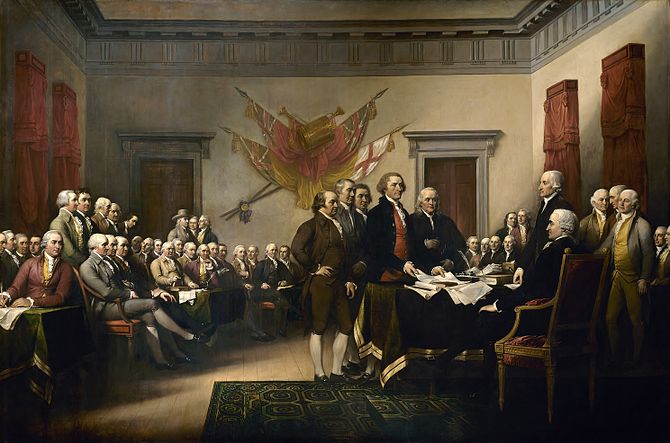Voting is one of the most sacred rights of free people. Without the vote, we are prey to any tin-pot tyrant to come along. He can rule without a care for our property and lives, seeking only to loot the people for his own ends.
By 1776, the tyranny of King George had become intolerable, and the Founders wrote the Declaration of Independence. This statement of principles emphasized the “consent of the governed” and the “right of Representation in the Legislature”. Men fought for these principles. Men died for them.
However, they left some unfinished business. In 1870, after having fought again for those same principles, they ratified the Fifteenth Amendment to the Constitution. Now the right to vote—the franchise—could not be denied to someone based on race. Unfortunately, they still left some unfinished business.

The Signing of the Declaration of Independence. (Photo credit: Wikipedia)
In 1920, after the women’s suffrage movement fought for many years, the Nineteenth Amendment was ratified. No one could be denied a vote on the basis of sex.
Now everyone has the vote. Politically, we’ve come a long way. By contrast, we have lost precious financial freedom. We have lost the right to vote with our money. Allow me to explain.
Before 1933, savers were in control. If you didn’t like the risks taken by the banking system or the interest rate, you could withdraw your gold or silver coin. Putting your money under your mattress is not just a quaint expression. Back then it was a real option.
This choice has an important and beneficial economic effect. When you withdraw your gold, it forces the bank to sell an asset, like bonds, to raise the money to pay you. This drives down the price of bonds and drives up the interest rate. When interest rates become high enough, people are again attracted to deposit their gold.
Think about going to the supermarket and seeing lobsters in the display case. You would love to have them for a romantic dinner, until you see the price. Then you buy the pork chops instead. If you buy the lobster, it encourages the store to raise the price. If you decide not to buy, it puts pressure on the store to lower the price.
This economic law works with interest rates the same way as with seafood. It’s far more important with interest. Everything in the economy is impacted by the rate of interest.
Unfortunately, the interest rate isn’t set this way anymore. There is no point to putting paper dollars under your mattress. If you don’t like getting 1/10 percent on your savings account, then tough luck. Withdrawing it for cash is like jumping out of the frying pan into the fire. You are still lending your savings—now to the Federal Reserve—only you get no interest. The Fed in turn lends it to banks and the US government.
We can complain about the paltry interest rate in bank accounts or bonds under the Fed’s zero interest rate policy. We can worry about the risks in the banking system, and the too big to fail policy. We can petition our lords at the Fed for mercy, and beg for relief from the drought of interest that withers our savings.
The fact is that our preferences don’t matter. The Fed may be trying to somehow stimulate employment and exports. It may be dealing favors to Wall Street and certain industries like construction. It may be desperately staving off bankruptcies by doling out cheap credit to insolvent debtors. Whatever its motivations, the Fed does to us what it wants.
We suffer under our monetary king. The Fed does to the savers what King George did to the colonists.
We are disenfranchised, and urgently need a Declaration of Monetary Independence.
See more for



















